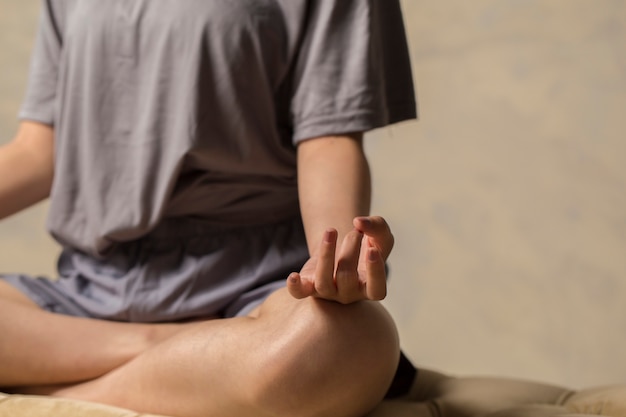Discover the Benefits of Meditation: Stress Reduction in Weeks

Discover the Benefits of Meditation: Reduce Stress by 20% in Just 2 Weeks with consistent practice, transforming your mental well-being through mindfulness and relaxation techniques, leading to a healthier and more balanced lifestyle.
Unlock a calmer and more focused you! Learn how to discover the benefits of meditation: reduce stress by 20% in just 2 weeks, and improve your overall well-being through mindfulness practices you can easily incorporate into your daily routine.
Understanding Meditation and Its Impact
Meditation is an age-old practice that has recently surged in popularity as people seek effective ways to manage stress and improve their mental clarity. But what exactly is meditation, and how does it work to reduce stress?
What is Meditation?
At its core, meditation is a practice of training your mind to focus and redirect your thoughts. It’s about achieving a mentally clear and emotionally calm state. There are many different types of meditation, each with its own unique approach.
For instance, mindfulness meditation focuses on paying attention to the present moment without judgment, while transcendental meditation uses a mantra to quiet the mind. Regardless of the specific technique, the goal remains the same: to cultivate a greater sense of awareness and inner peace.
How Meditation Reduces Stress
Meditation reduces stress by influencing the body’s stress response system. Chronic stress leads to elevated levels of cortisol, the primary stress hormone. Meditation helps to regulate this response by activating the parasympathetic nervous system, often referred to as the “rest and digest” system.
- Lowers Cortisol Levels: Regular meditation practice has been shown to lower cortisol levels, reducing the physical symptoms of stress.
- Increases Relaxation Response: Meditation promotes a state of relaxation by slowing heart rate, lowering blood pressure, and easing muscle tension.
- Enhances Emotional Regulation: Meditation improves your ability to manage emotions, reducing reactivity to stressful situations.
In conclusion, meditation offers a powerful tool for stress reduction by promoting relaxation, regulating stress hormones, and enhancing emotional well-being. By integrating meditation into your daily life, you can experience significant improvements in your overall health and happiness.

Scientific Evidence Supporting Meditation
While the anecdotal benefits of meditation have been recognized for centuries, modern scientific research now backs up these claims with empirical evidence. Numerous studies have explored how meditation affects the brain, body, and overall well-being.
Brain Changes with Meditation
Neuroimaging studies have revealed that meditation can lead to structural and functional changes in the brain. One notable finding is the increase in gray matter in regions associated with attention, emotion regulation, and self-awareness.
For example, the prefrontal cortex, responsible for executive functions, tends to thicken with regular meditation practice. Additionally, the amygdala, which processes emotions like fear and anxiety, shows reduced activity during meditation, further supporting its stress-reducing effects.
Research-Backed Benefits
Several studies have investigated the impact of meditation on various aspects of health. One such study published in the Journal of the American Medical Association (JAMA) found that mindfulness meditation significantly reduced symptoms of anxiety and depression.
- Improved Mental Health: Meditation has been found to be effective in treating anxiety disorders, depression, and post-traumatic stress disorder (PTSD).
- Reduced Chronic Pain: Studies have shown that meditation can help reduce the perception of pain and improve the quality of life for individuals with chronic pain conditions.
- Enhanced Cognitive Function: Meditation can improve attention span, memory, and cognitive flexibility.
In summary, scientific evidence supports the effectiveness of meditation in promoting mental and physical health. From structural changes in the brain to improved emotional regulation, the benefits of meditation are increasingly recognized by the scientific community.
Different Types of Meditation Techniques
There’s no one-size-fits-all approach when it comes to meditation. The variety of techniques available allows you to find a practice that resonates with your personal preferences and goals. Here are some popular meditation techniques to explore:
Mindfulness Meditation
Mindfulness meditation involves focusing on the present moment without judgment. You pay attention to your thoughts, feelings, and sensations as they arise, without getting carried away by them. This type of meditation is often practiced by focusing on the breath.
To practice mindfulness meditation, find a quiet place, sit comfortably, and close your eyes. Then, bring your attention to your breath, noticing the sensation of each inhale and exhale. When your mind wanders, gently redirect your focus back to your breath.
Transcendental Meditation (TM)
Transcendental Meditation involves the use of a mantra, a specific sound or word, to quiet the mind. During TM, you repeat the mantra silently, allowing your mind to settle into a deeper state of relaxation.
- Loving-Kindness Meditation: Cultivate feelings of compassion and kindness towards yourself and others by repeating phrases of goodwill.
- Walking Meditation: Combine meditation with physical activity by focusing on the sensation of walking and the movement of your body.
- Yoga and Meditation: Integrate meditation into your yoga practice to enhance the mind-body connection and promote relaxation.
In conclusion, exploring different meditation techniques can help you discover the practice that best suits your needs and preferences. Each technique offers unique benefits, from cultivating mindfulness to promoting emotional well-being.
Creating a Meditation Routine for Stress Reduction
Establishing a consistent meditation routine is crucial for experiencing its full benefits. Here are some practical tips on how to integrate meditation into your daily life, even with a busy schedule:
Setting Realistic Goals
Start with small, achievable goals. Aim for just 5-10 minutes of meditation per day and gradually increase the duration as you become more comfortable with the practice. Consistency is more important than the amount of time you spend meditating.
Choose a specific time of day for your meditation practice and stick to it as much as possible. Many people find it helpful to meditate first thing in the morning or right before bed.
Finding a Quiet Space
Create a dedicated meditation space in your home where you can relax without distractions. This could be a corner of a room, a quiet space in your garden, or any place where you feel comfortable and at peace.
- Guided Meditation Apps: Utilize guided meditation apps like Headspace or Calm to help you stay focused and motivated.
- Breathing Exercises: Incorporate simple breathing exercises, such as deep belly breathing, into your meditation practice.
- Journaling: After each meditation session, take a few minutes to journal about your experience and any insights you gained.
To conclude, creating a meditation routine that fits seamlessly into your lifestyle is key to reducing stress and enhancing your overall well-being. By integrating these tips into your daily routine, you can experience the transformative benefits of regular meditation practice.

Overcoming Challenges in Meditation Practice
Like any new skill, meditation can present challenges, especially in the initial stages. Common obstacles include a wandering mind, restlessness, and difficulty finding the time for regular practice. Here are some strategies to overcome these challenges:
Dealing with a Wandering Mind
It’s perfectly normal for your mind to wander during meditation. The key is not to get frustrated or discouraged. Instead, gently redirect your attention back to your breath or your chosen focal point.
Remember that meditation is a practice of training your attention. The more you practice, the easier it will become to stay focused.
Addressing Restlessness
If you find it difficult to sit still during meditation, try incorporating movement-based meditation techniques like walking meditation or yoga. These practices allow you to channel your energy while still cultivating mindfulness.
- Patience: Be patient with yourself and acknowledge that progress takes time.
- Adjusting Technique: Experiment with different meditation techniques until you find one that resonates with you.
- Seeking Guidance: Consider attending a meditation class or working with a meditation teacher for personalized guidance.
To sum up, overcoming challenges in meditation practice is a natural part of the journey. By addressing these obstacles with patience and persistence, you can deepen your practice and experience its transformative benefits.
Expected Results and Long-Term Benefits
Consistent meditation practice can lead to significant improvements in your overall well-being. While results may vary from person to person, many individuals report a noticeable reduction in stress levels, improved focus, and enhanced emotional regulation. Let’s explore the expected results and long-term benefits of meditation:
Stress Reduction Timeline
Many beginners report experiencing a reduction in stress within just a few weeks of starting a regular meditation practice. One study demonstrated that participants who meditated for 20 minutes a day experienced a 20% reduction in stress levels after just two weeks.
Within a few months, you may notice more profound changes in your overall well-being. These changes can include improved sleep quality, increased emotional resilience, and a greater sense of inner peace.
Long-Term Advantages
The long-term benefits of meditation extend far beyond stress reduction. Regular practice can lead to lasting improvements in your mental, emotional, and physical health. For example, meditation has been shown to lower blood pressure, improve cardiovascular health, and boost the immune system.
- Enhanced Relationships: Meditation can improve your ability to communicate effectively, empathize with others, and resolve conflicts harmoniously.
- Increased Self-Awareness: Meditation can help you gain deeper insights into your thoughts, feelings, and behaviors, leading to greater self-understanding.
- Spiritual Growth: Meditation can foster a deeper connection with yourself and the world around you, leading to a more meaningful and fulfilling life.
In conclusion, consistent meditation practice offers a pathway towards lasting well-being. From immediate stress reduction to long-term improvements in mental and physical health, the benefits of meditation are well-documented and transformative.
| Key Point | Brief Description |
|---|---|
| 🧘 Stress Reduction | Meditation lowers cortisol levels, reducing physical stress symptoms. |
| 🧠 Brain Changes | Increases gray matter in areas linked to attention and emotion regulation. |
| ⏰ Consistent Practice | Regular meditation enhances long-term mental and physical health. |
| 😊 Emotional Well-being | Enhances emotional regulation and promotes inner peace. |
Frequently Asked Questions
▼
Many people experience noticeable stress reduction within just two weeks of consistent meditation practice, even with sessions as short as 20 minutes per day.
▼
Mindfulness meditation and transcendental meditation are highly effective for stress reduction, though the best type depends on your personal preferences and comfort level.
▼
Yes, studies have shown that regular meditation can lead to structural changes in the brain, such as increased gray matter in regions associated with attention and emotion regulation.
▼
Start with small, achievable goals, such as 5-10 minutes of meditation per day, and choose a specific time of day to meditate, such as early morning or before bed.
▼
It’s normal for your mind to wander. Gently redirect your attention back to your breath or your chosen focal point without getting frustrated, remembering that meditation is a practice.
Conclusion
Discover the benefits of meditation: reduce stress by 20% in just 2 weeks by making it a consistent part of your lifestyle. From reducing stress and improving mental clarity to enhancing overall well-being, meditation offers a holistic approach to health that can transform your life.